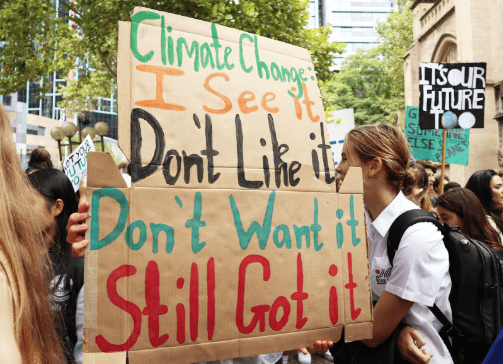We are in the middle of a climate crisis, so feeling some level of distress about it is absolutely understandable. In fact, there’s a name for a fear of climate change . . .

We are in the middle of a climate crisis, so feeling some level of distress about it is absolutely understandable. In fact, there’s a name for a fear of climate change – Solastalgia. Climate change is an existential threat and feeling scared because you might be impacted is completely normal.
The first thing to know is that looking after ourselves is important; not only for our own wellbeing but for our capacity to be changemakers. Change is possible but it can only happen if we take care of ourselves – physically and mentally.
We, humans, are intelligent creatures. We are capable of coming up with alternatives to our current lifestyles and to stop human-induced climate change. But we can’t do that if everyone is nervous and under stress. When your mental health is not at its best, and you’re feeling anxious and stressed, it affects your ability to think creatively and use your problem-solving skills.
Recognising when to seek professional help:
If you’re experiencing climate-related distress to the degree where you suspect it’s causing mental health issues such as chronic stress, anxiety, or depression, the best course of action is to get in contact with professionals. Many organizations such as Headspace ((03) 9027 0100), BeyondBlue,(1300 22 4636) and Lifeline (13 11 14) offer free support.
Identifying and alleviating burn-out and exhaustion:
Lobbying for climate action can be exhausting, both physically and mentally. If you’ve got that feeling of hopelessness and being ‘burnt-out’, here are steps you can take to recharge yourself:
1. Check in on yourself: Ask yourself these questions from by the Mayo Clinic:
- Have you become cynical or critical at work?
- Do you drag yourself to work and have trouble getting started?
- Have you become irritable or impatient with co-workers, customers or clients?
- Do you lack the energy to be consistently productive?
- Do you find it hard to concentrate?
- Do you lack satisfaction from your achievements?
- Do you feel disillusioned about your job?
- Are you using food, drugs or alcohol to feel better or to simply not feel?
- Have your sleep habits changed?
- Are you troubled by unexplained headaches, stomach or bowel problems, or other physical complaints?
If you answered yes to any of these questions, it may be a sign that you’re experiencing Activist burnout.
2. Talk to a friend or other like-minded people: It is important to surround yourself with people who care about the same things as you do. Sometimes with climate activism, it can feel like you’re screaming at a wall when politicians don’t do anything. But, when you see other people like yourself who care about the same things as you, you feel less lonely. Afterall, unity is strength.
3. Focus on hope: It’s very easy to focus on all the negatives. As climate activists, we face many disappointments and failures. But learning from them and continuing to have hope is what will spark change.
4. Exercise: Regular exercise is not just good for your physical health but it’s been proven to be as good as therapy and medication when treating mild-moderate depression. Exercise releases chemicals such as endorphins and serotonin in your brain which make you feel happier. It gives you a sense of accomplishment and helps you sleep better at night.
5. Know your limits: Finally, it’s important to know when to say ‘no’. Having clear priorities in life is a key part of being able to do this. Making conscious choices about what you spend your time and energy on is essential. There’s not long until human-induced climate change becomes irreversible. So, it’s crucial to prioritise how you use your time, energy and other resources.
[optin-monster-shortcode id=”mxeumvabyaahsrrlikht”]
A case for having hope:
There’s still time to minimize global heating and avoid the worst impacts of climate damage. If we work together quickly, we can stop further damaging our home. Look at the actions people are taking to fix this. We need to call on big polluters to take climate seriously.
The question isn’t can we save our planet. It’s will we save it.
There’s no time to stand on the sidelines anymore. This is a moment where we need to band together to declare a climate emergency and resist the inaction from coal-loving politicians. Come join our Break Free Trainings. The trainings will help you to skill-up and get out into your community to make some noise. You will leave this training with a plan for your very own activity to protect the climate in your community. We’re going to need every bit of that power for the fight ahead. It’s time to organize, the action is only starting. No ‘activism experience’ necessary.


